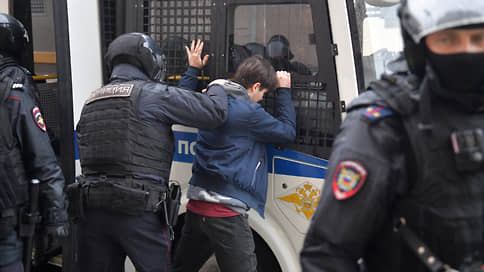The opposition leaves for demobilization – Newspaper Kommersant No. 183 (7384) dated 10/04/2022
[ad_1]

The partial mobilization announced in Russia not only did not lead to a noticeable increase in protest activity, but, on the contrary, turned into a virtual freeze of non-systemic opposition activity. Even the Yabloko party, which criticized the special operation in Ukraine from the very beginning, stopped applying for rallies and generally limited its activity. As Kommersant found out, the same picture is observed in the Russian regions, where many protest movements have closed over the past year, and the most prominent oppositionists have emigrated or found themselves under criminal prosecution. Experts believe that the current Russian opposition is looking more and more like Soviet dissidents.
In the first week after the decree on partial mobilization was issued on September 21, protests took place in three dozen Russian cities. All of them were unauthorized: in some cases, people went out spontaneously, in others – at the call of the St. Petersburg movement “Spring”. The latter circumstance was the reason for the appeal of the prosecutor of St. Petersburg to the court with a demand to recognize this organization as extremist. It should be reminded that in May a criminal case was already initiated against Viasna activists on the basis of the creation of an NGO that encroaches on the personality and rights of citizens (Article 239 of the Criminal Code).
Kommersant did not record attempts to organize legal protests against mobilization by parties, public associations or individual citizens. Previously, Yabloko activists were mainly involved in filing such applications, but there Kommersant explained that they no longer see the point in this, since “rallies are still banned.” Kommersant’s interlocutors in the party also admitted that they deliberately reduced their activity after the recent elections and the announcement of partial mobilization “because of fatigue and fear for their supporters”, many of whom began to leave Russia. It should be noted that for criticizing the special operation, four Yabloko members (including the chairmen of the branches in Yakutia and Kamchatka) have already become defendants in criminal cases.
Experts interviewed by Kommersant believe that the main reason for curtailing opposition activity is the elimination of non-systemic movements. Over the past year and a half, the Open Russia organization has announced its liquidation, structures of the opposition leader Alexei Navalny have been banned, activists of the unregistered Libertarian Party have stopped working in Russia, the Solidarity movement and the City Projects Foundation have suspended their activities (before the start of the special operation, they were preparing for municipal elections). The leaders and activists of these movements became defendants in criminal cases or emigrated. Several human rights projects have also closed, and most of the remaining projects have moved most of their assets abroad due to tightening legislation.
In addition, according to Kommersant, over the past year, the regions have lost almost all local activists and public opinion leaders who had successful experience in organizing protests. For example, only the lawyer Mikhail Benyash, a defendant in a criminal case on the use of force against a policeman, remained among the notable activists in the Kuban. In the Stavropol Territory, the Solar Patrol movement of environmentalists was disbanded, the coordinator of which Mikhail Parshin moved to another region and left human rights activities. And in Chelyabinsk, the leader of the Stop GOK movement, Vasily Moskovets, who was repeatedly detained by the police and eventually received a suspended sentence on charges of setting fire to an industrial enterprise, disbanded his organization, citing “the impossibility of further work and protection of one’s rights” as one of the reasons.
Under pressure from the security forces, some professional politicians were forced to suspend their activities in the regions. For example, Sergei Boyko and Helga Pirogova, elected from the opposition Coalition 2020 to the Novosibirsk City Council, left Russia because of their connection with the structures of Alexei Navalny and criticism of the special operation in Ukraine. Because of the risks of falling under a criminal case, the former State Duma deputy, the well-known Novosibirsk opposition leader Arkady Yankovsky, emigrated. The ranks of the opposition have noticeably thinned even in the traditionally protest regions. Thus, the very popular ex-mayor of Yekaterinburg Yevgeny Roizman (who is under a “prohibition of certain actions” in the case of discrediting the Armed Forces of the Russian Federation) and a former deputy of the Legislative Assembly of St. Petersburg Maxim Reznik (sentenced to five months in a colony-settlement for possession of 18.2 grams of marijuana, released due to serving time in a pre-trial detention center, left Russia in September).
Movements of a narrower profile, “squeezed out” from other regions, have survived and continue their work, taking into account the restrictions imposed. But basically their activity in the regions comes down to writing letters in support of political prisoners and increasingly rare attempts to organize protest actions on local local problems. For example, on September 15 in Samara, residents of one of the houses, dissatisfied with air pollution, tried to gather such a rally, but the mayor’s office refused to coordinate their action.
Political scientist Aleksey Makarkin compares the oppositionists who have remained in Russia with dissidents who, as in Soviet times, cannot change the situation in the country because they do not have the tools to really influence the situation: “The number of their supporters is rapidly decreasing due to emigration. Yes, small opposition groups are doing some actions, but where is their audience and who knows them among the masses? Political scientist Pavel Salin adds that the part of the opposition that remains in Russia is more efficient than the one that emigrated, but he considers the activities of the activists to be “hipster” and “cut off from the deep people.”
[ad_2]
Source link








